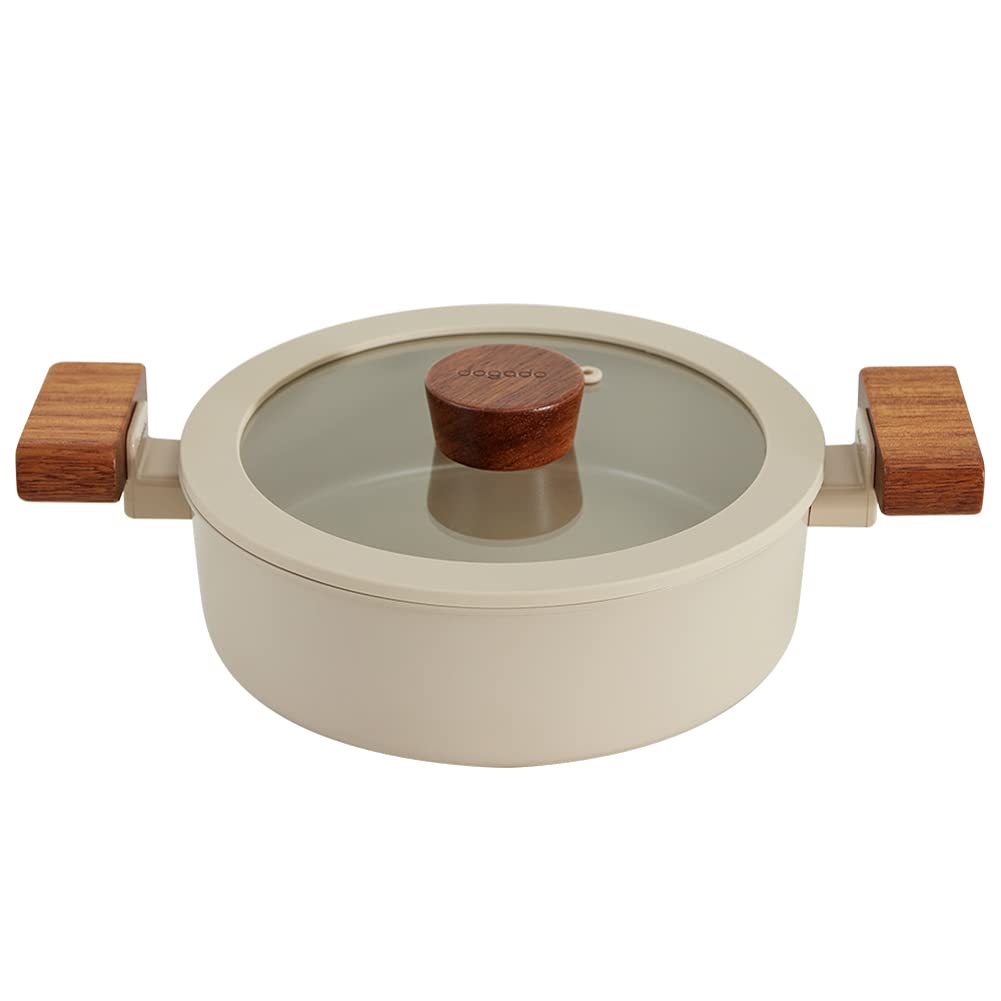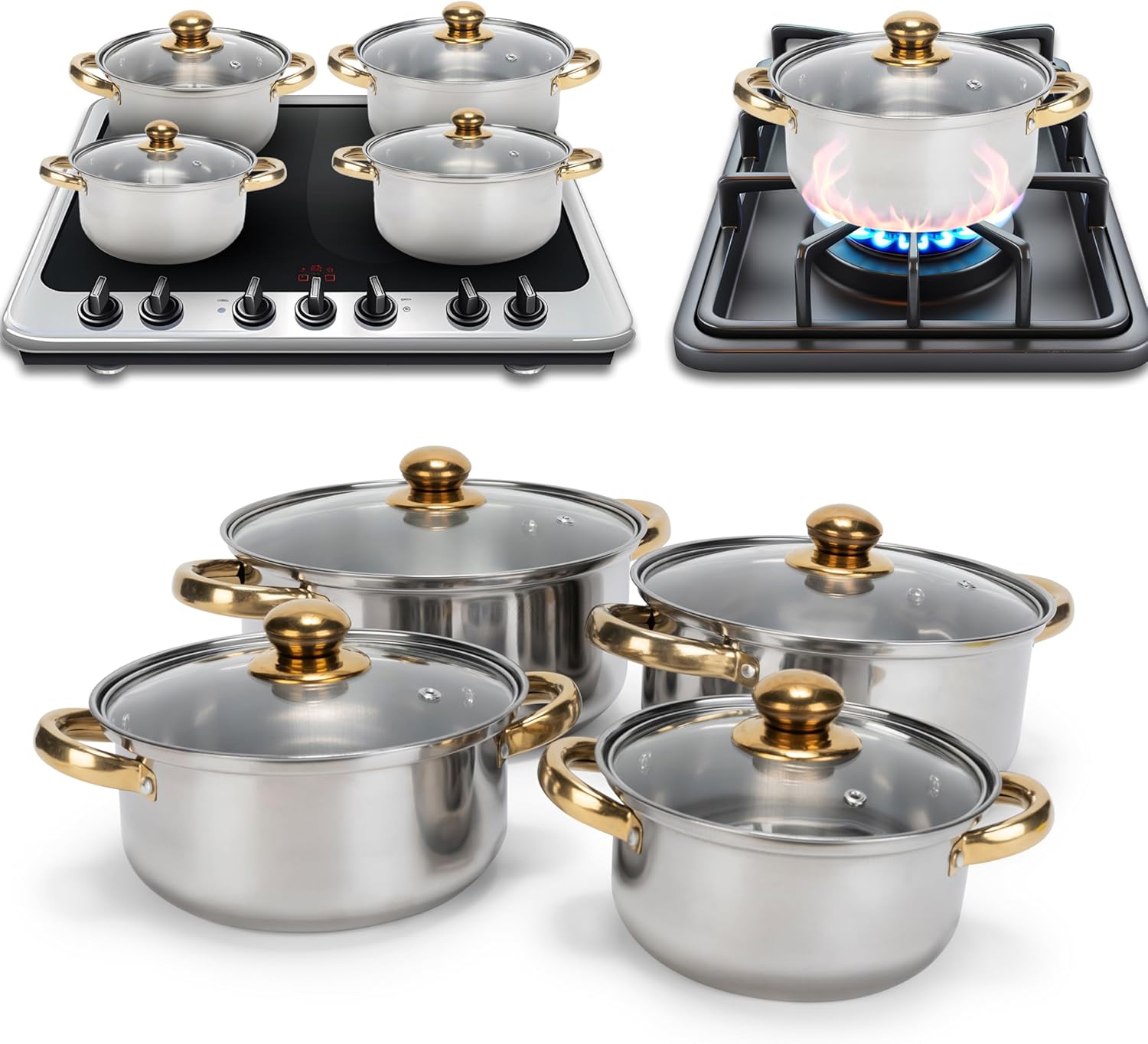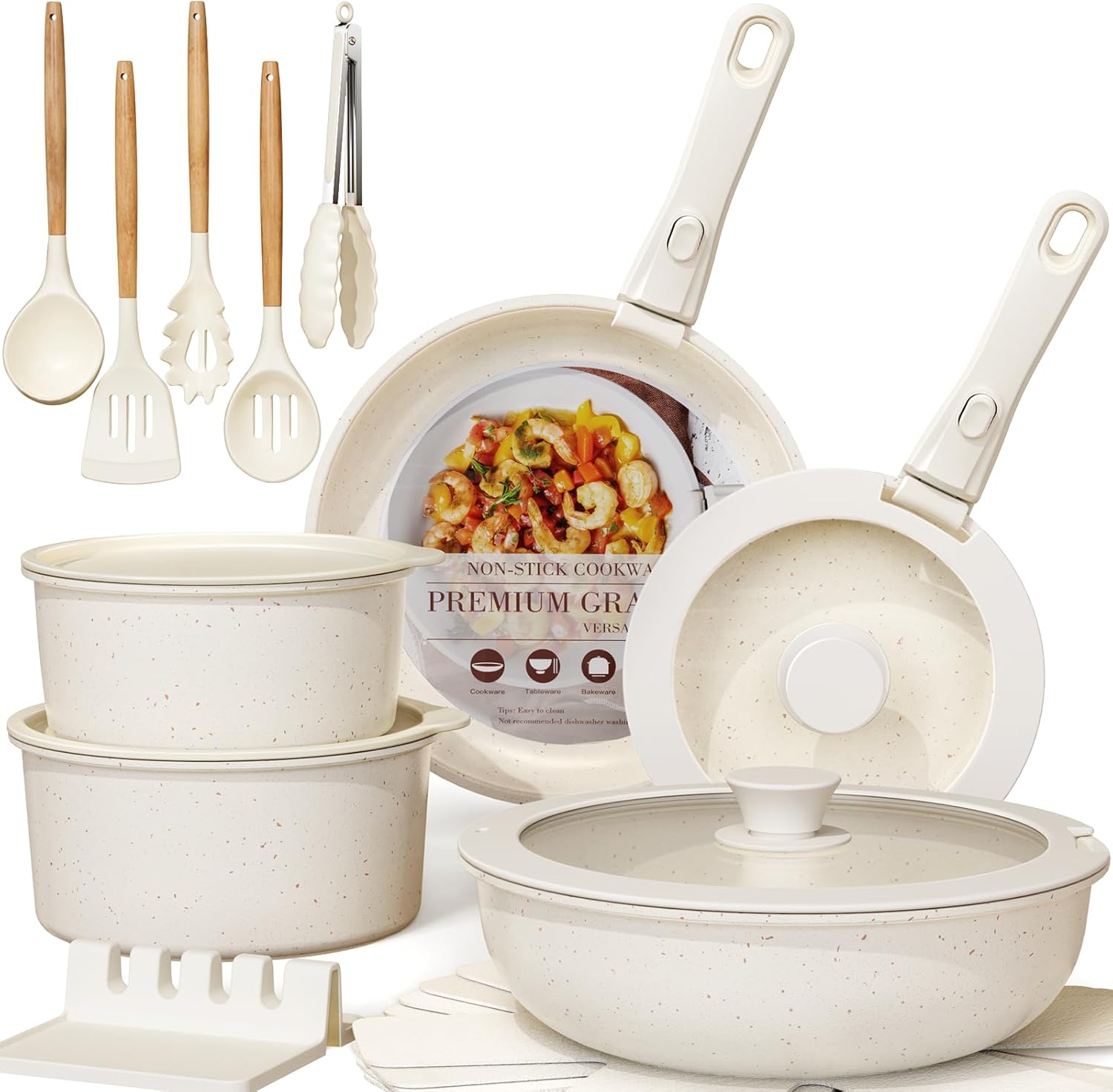Organic cookware is a popular choice for many home cooks. It offers a healthier way to prepare meals.
More people are becoming aware of the dangers of chemicals in traditional cookware. This shift leads them to seek safer options. Using organic cookware means you can enjoy cooking without worrying about harmful substances. These products are often made from natural materials, like ceramic or stainless steel.
They help maintain the nutrients in your food while ensuring better taste. Many people also appreciate how organic cookware is eco-friendly. It reduces waste and promotes a healthier planet. This guide will explore the benefits and options of organic cookware, helping you make informed choices for your kitchen.
Embracing The Eco-friendly Kitchen Movement
The eco-friendly kitchen movement is gaining popularity. People are choosing products that are better for the planet. One key element of this movement is organic cookware. Using organic cookware helps reduce harmful chemicals in your kitchen. It supports sustainable practices and promotes health. Let’s explore why this matters.
Why Going Green Matters
Choosing eco-friendly options is essential for many reasons:
- Protects the Environment: Organic cookware reduces toxic waste.
- Healthier Choices: Less exposure to harmful chemicals.
- Sustainable Practices: Supports farmers who use natural methods.
- Better for Future Generations: Preserves resources for kids.
Benefits Of Organic Cookware
Organic cookware offers several benefits:
| Benefit | Description |
|---|---|
| Non-Toxic Materials | Made from natural materials. No harmful chemicals. |
| Durability | Lasts longer than traditional cookware. Saves money over time. |
| Better Heat Distribution | Cooks food evenly. Improves cooking results. |
| Easy to Clean | Most organic cookware is dishwasher safe. Simplifies cleanup. |
Choosing organic cookware means making responsible choices. It supports a healthier lifestyle. Your kitchen can reflect your values.

Credit: www.organicauthority.com
Materials Matter: Choosing Eco-friendly Cookware
Choosing the right cookware affects health and the planet. Eco-friendly cookware uses materials that are safe and sustainable. This section covers what materials are best and which to avoid.
Sustainable Materials To Look For
When shopping for eco-friendly cookware, focus on these materials:
- Cast Iron: Durable and long-lasting. Great for cooking.
- Stainless Steel: Non-reactive and safe. Easy to clean.
- Glass: Non-toxic and recyclable. Good for baking.
- Ceramic: Non-stick and chemical-free. Safe for health.
- Bamboo: Renewable and biodegradable. Good for utensils.
| Material | Benefits | Care |
|---|---|---|
| Cast Iron | Durable, retains heat well | Season regularly |
| Stainless Steel | Non-reactive, durable | Dishwasher safe |
| Glass | Non-toxic, easy to see food | Hand wash recommended |
| Ceramic | Safe, non-stick surface | Use non-metal utensils |
| Bamboo | Lightweight, eco-friendly | Hand wash, avoid soaking |
Materials To Avoid
Not all cookware is safe. Steer clear of these materials:
- Teflon: Can release toxic fumes.
- Aluminum: May react with acidic foods.
- Plastic: Can leach chemicals into food.
- Non-stick coatings: Often contain harmful chemicals.
Choosing the right materials helps protect your health. It also benefits the environment. Make informed decisions to enjoy safe cooking.
Top Picks For Organic Cookware Essentials
Choosing the right cookware can enhance your cooking experience. Organic cookware is safe, healthy, and eco-friendly. Here are some top picks that every kitchen should have.
Cast Iron Classics
Cast iron cookware is durable and versatile. It can last a lifetime with proper care. Here are some benefits:
- Excellent heat retention
- Natural non-stick surface
- Suitable for all cooking surfaces
Popular options include:
| Product | Size | Price |
|---|---|---|
| Cast Iron Skillet | 10 inches | $25 |
| Cast Iron Dutch Oven | 5 quarts | $60 |
Ceramic Favorites
Ceramic cookware is a popular choice for healthy cooking. It is non-toxic and non-stick. Here are the key features:
- No harmful chemicals
- Even heat distribution
- Easy to clean
Top ceramic picks include:
- Ceramic Frying Pan
- Ceramic Baking Dish
- Ceramic Saucepan
Stainless Steel Staples
Stainless steel cookware is a kitchen essential. It is strong and resistant to rust. Benefits include:
- Durable and long-lasting
- Non-reactive with foods
- Easy to maintain
Must-have stainless steel items are:
- Stainless Steel Stockpot
- Stainless Steel Saucepan
- Stainless Steel Skillet
Caring For Your Organic Cookware
Caring for your organic cookware is essential. Proper care keeps your cookware safe and lasting longer. Organic cookware includes materials like ceramic, cast iron, and stainless steel. Each type has its own care instructions. Following these tips helps maintain their quality and performance.
Maintenance Tips
Regular maintenance is key for your organic cookware. Here are some important tips:
- Wash gently: Use warm water and mild soap.
- Avoid harsh chemicals: They can damage the surface.
- Dry promptly: Prevent rust or stains by drying immediately.
- Use soft cloths: Scrub with non-abrasive materials.
- Store carefully: Avoid stacking without protection.
Longevity Practices
To extend the life of your cookware, consider these practices:
- Season cast iron: Apply a thin layer of oil regularly.
- Avoid high heat: Use medium heat for best results.
- Use wooden or silicone utensils: Protect the surface.
- Check for damage: Inspect regularly for chips or cracks.
- Follow manufacturer’s guidelines: Each brand has specific care instructions.
| Cookware Type | Care Instructions |
|---|---|
| Ceramic | Wash gently and avoid metal utensils. |
| Cast Iron | Season regularly and avoid soap. |
| Stainless Steel | Use mild soap and dry immediately. |
Cooking With Organic Cookware: Tips And Tricks
Using organic cookware can make cooking easier and healthier. Here are some practical tips to enhance your cooking experience. Learn about heat management, cooking techniques, and food release tips to get the best results.
Heat Management
Heat management is crucial for cooking with organic cookware. Too much heat can damage the surface. Here are some tips:
- Start with medium heat. Gradually increase it as needed.
- Use a thermometer to check the temperature.
- Preheat your cookware before adding food.
- Always keep an eye on food to prevent burning.
These simple steps help maintain the integrity of your cookware. They also enhance the flavor of your dishes.
Cooking Techniques
Different cooking techniques work well with organic cookware. Here are some effective methods:
- Sautéing: Use minimal oil for a crisp texture.
- Steaming: Preserve nutrients by steaming vegetables.
- Baking: Opt for lower temperatures to avoid sticking.
- Simmering: Use low heat for sauces and soups.
Experiment with these techniques. They can help you create tasty meals.
Food Release Tips
Preventing food from sticking is important. Here are some food release tips:
- Always preheat your cookware.
- Use enough oil or butter for cooking.
- Let food cook thoroughly before flipping.
- Use non-metal utensils to avoid scratches.
Following these tips can help your meals slide right off. Enjoy cooking with ease.

Credit: www.amazon.com
Accessorizing Your Eco-friendly Kitchen
Creating an eco-friendly kitchen goes beyond just using organic cookware. It involves choosing the right accessories. These items not only help in cooking but also support a sustainable lifestyle. Let’s explore essential accessories to complete your eco-friendly kitchen.
Organic Utensils
Using organic utensils is a smart choice. They are safe and made from natural materials. Here are some popular options:
- Bamboo spoons: Durable and biodegradable.
- Wooden spatulas: Gentle on cookware and non-toxic.
- Silicone utensils: Heat-resistant and easy to clean.
Choose utensils that are free from harmful chemicals. Look for brands that prioritize sustainability. This way, you ensure your cooking remains eco-friendly.
Eco-friendly Storage Solutions
Storage plays a key role in a green kitchen. Eco-friendly storage solutions help reduce waste. Consider these options:
| Type | Material | Benefits |
|---|---|---|
| Glass jars | Recycled glass | Reusable and non-toxic |
| Bamboo containers | Bamboo | Biodegradable and stylish |
| Cloth bags | Organic cotton | Reusable and washable |
Invest in reusable bags for produce. They cut down on plastic waste. Use glass containers for leftovers. They keep food fresh without harmful chemicals.
Organizing your kitchen with eco-friendly accessories helps the planet. It enhances your cooking experience. Choose wisely and enjoy a cleaner, greener kitchen.
The Cost Of Going Green In The Kitchen
Choosing organic cookware often raises questions about costs. Many wonder if it is worth the money. Organic cookware can be more expensive. But is it a smart investment? Let’s explore the costs and savings.
Investment Vs. Savings
Buying organic cookware is a choice. It may cost more upfront. Yet, it can save money in the long run. Here are some points to consider:
- Durability: Organic cookware lasts longer than traditional options.
- Health benefits: Using safer materials means fewer health risks.
- Energy efficiency: Some organic cookware heats faster, saving energy.
Think about the long-term effects. Investing in quality cookware can pay off. You spend less on replacements and medical bills.
Cost Comparison With Traditional Cookware
| Type of Cookware | Average Cost | Durability (Years) | Health Impact |
|---|---|---|---|
| Organic Cookware | $100 – $300 | 10+ | Low risk of toxins |
| Traditional Cookware | $30 – $150 | 3 – 5 | Higher risk of chemicals |
From the table, organic cookware costs more. Yet, it lasts longer. It also reduces health risks. Traditional cookware may seem cheaper. But it requires more frequent replacements.
When choosing cookware, think about your priorities. Is health more important? Or is saving money now your focus? Consider how often you cook. If you cook frequently, organic options may save you more.
From The Market To The Plate: The Organic Cooking Experience
The journey of organic cooking starts at the market. Choosing fresh, organic ingredients makes a big difference. This experience connects you to your food. It promotes health, sustainability, and flavor. Enjoying organic meals means enjoying life more.
Choosing Organic Ingredients
Choosing organic ingredients is the first step. These ingredients are grown without harmful chemicals. They are better for your health and the environment.
- Fruits and Vegetables: Look for seasonal and local options.
- Grains: Choose whole grains like brown rice and quinoa.
- Proteins: Select organic meat, eggs, and legumes.
- Dairy: Opt for organic milk, cheese, and yogurt.
Read labels carefully. Look for certifications like USDA Organic. This ensures your food is truly organic. Freshness also matters. Visit farmers’ markets for the best choices.
Full Circle Sustainability
Organic cooking supports sustainability. It helps create a healthy environment. Here’s how:
| Aspect | Benefit |
|---|---|
| Soil Health | Organic farming improves soil quality. |
| Biodiversity | Supports a wide range of plants and animals. |
| Water Conservation | Reduces water pollution and saves resources. |
| Carbon Footprint | Lower emissions from organic farming practices. |
Cooking organic meals reduces waste. Use leftovers creatively. Compost scraps to enrich your garden. This full circle approach benefits everyone.

Credit: www.amazon.com
Frequently Asked Questions
What Are The Benefits Of Organic Cookware?
Organic cookware is free from harmful chemicals, making it safer for cooking. It promotes healthier meals by preventing the leaching of toxins into food. Additionally, these products often use sustainable materials, which is better for the environment. Using organic cookware can lead to better taste and improved cooking results.
Is Organic Cookware Worth The Investment?
Yes, organic cookware is a valuable investment for health-conscious individuals. While it may have a higher upfront cost, the long-term benefits outweigh the price. These products last longer and reduce health risks associated with conventional cookware. Investing in organic options can enhance your cooking experience and promote well-being.
How To Maintain Organic Cookware?
Maintaining organic cookware is straightforward and essential for longevity. Always use gentle cleaning methods to avoid damaging the surface. Avoid harsh chemicals and opt for natural cleaners instead. Regularly inspect for wear and tear, and follow manufacturer guidelines for care.
Proper maintenance ensures optimal performance and a longer lifespan.
Can I Use Metal Utensils With Organic Cookware?
Using metal utensils with organic cookware depends on the material. Some organic cookware is scratch-resistant, while others may get damaged. It’s best to check the manufacturer’s recommendations. Generally, silicone or wooden utensils are safer options that protect the cookware’s surface.
This practice prolongs the cookware’s life and maintains its performance.
Conclusion
Choosing organic cookware is a smart move for your health. It reduces exposure to harmful chemicals. Cooking with natural materials enhances flavor and nutrition. Plus, it’s better for the environment. You can enjoy peace of mind knowing you’re making a safe choice.
Investing in quality organic cookware pays off in the long run. It helps create delicious meals without worry. Make the switch today. Enjoy cooking with healthier options. Your kitchen deserves it.





Leave a Reply